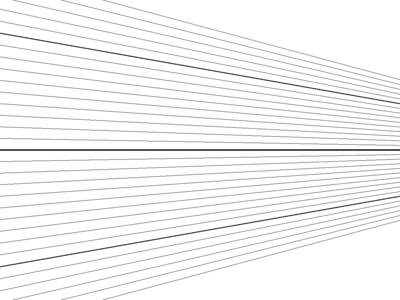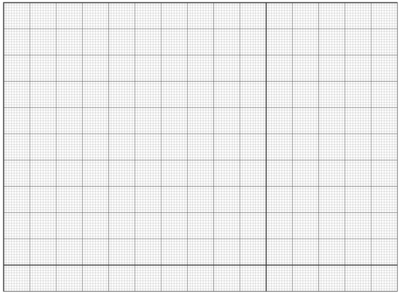User:MitchellNCharity/Old
Contents
Graph paper background
Converging lines to eyeball angles
A rough draft experimental tool to measure angles by holding up the laptop screen to your eye and looking along sight lines. Objective: measure the angle between things in the environment. The idea: hold up the laptop, and put your eye to the edge, so the lines all appear to converge at you.
Show-stopper(?): kentquirk reports a 20% viewing angle limit on B2 in both modes (with color artifacts at 45%). 20% seems perhaps borderline. But experiments on mockups suggest 20% could still leave you with ~1/3 degree accuracy. My current plan is to try it on a laptop.
The camera is an another way to measure environmental angles.
Here is a quick draft. I'll wait for the reality check before fleshing it out. Lines are at 1 degree intervals. The eye convergence is currently set at 100 mm from the screen edge.

SVG might be a better tech. Or even python.
Random brainstorming
In User_talk:MitchellNCharity. And Talk:Educational_content_ideas#Laptop as flexible physical object (ruler, etc).
How Big Are Things? at 800dpi might show up life-size on the laptop.
NASA's Visible Earth images for OLPC countries - Possible demo content?
NASA's Visible Earth has images sorted by country. Perhaps they might make good demo fodder. Some are whole country, others just a feature. Some are topical (some fire, or erosion, etc). Most have descriptive text (in english). Some stereo pairs.
TCC Tiny C Compiler - Include C toolchain on OLPC laptop?
My impression is a gcc toolchain is not planned for the laptop, due to space limitations (a fuzzy recollection - I now can't find it mentioned). So I note TCC, a Tiny C Compiler for x86. GCC compatible, small and fast. Same author as QEMU. So a C toolchain would fit on the laptop.
I also note its libtcc, which permits disk-less run-time C compilation and linking. Just in case anyone encounters a need for it.
Content: Images of currency - coins and bills/notes
Coins are good for counting and arithmetic activities. Kids may have seen them and think them important, they are stackable, etc.
